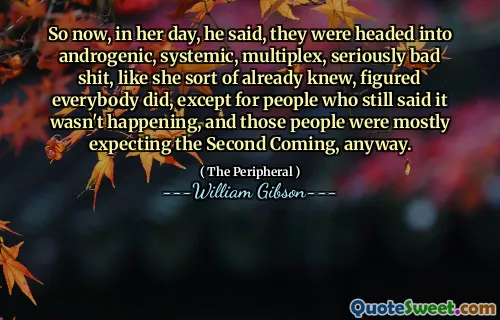"The Peripheral," a novel by William Gibson, explores the convergence of technology and society through a science fiction lens. The story is set in two intertwined futures—one in a near-future rural America and another in a post-apocalyptic London. The protagonist, Flynne Fisher, works as a 3D printer repair technician and finds herself drawn into a complex web of conspiracy after she interacts with a virtual reality system that allows her to connect to another timeline.
As the narrative unfolds, Flynne discovers that her actions in the past can have significant repercussions in the future. The novel delves into themes of identity, reality, and the moral implications of technology, raising questions about the nature of existence and the impact of our choices across time. The interplay between the two timelines serves as a vehicle to critique contemporary issues related to surveillance, capitalism, and social disparity.
Gibson's intricate world-building and layered characters create a gripping tale that challenges readers to consider how emerging technologies might shape our lives. The Peripheral not only provides a thrilling plot but also encourages deep reflection on our present trajectory. Ultimately, the novel serves as a cautionary tale about the potential consequences of our current path, highlighting the interconnectedness of individual actions and broader societal trends.
More »
Today Birthdays
1943 -
Sam Shepard
1957 -
Daniel Gilbert
1926 -
John Berger
1967 -
Jen Lancaster
1965 -
Atul Gawande
1855 -
Eugene V. Debs
1980 -
Clay Clark
1893 -
Raymond Loewy
1983 -
Alexa Chung
1857 -
Ida Tarbell
1988 -
Virat Kohli
1955 -
Kris Jenner
1920 -
Douglass North
1939 -
Lobsang Tenzin
1961 -
Alan G. Poindexter
1976 -
Ben Quayle
1892 -
John B. S. Haldane
1971 -
Jonny Greenwood
1940 -
Ted Kulongoski
1918 -
George A. Sheehan
1931 -
Ike Turner
1948 -
Peter Hammill
1967 -
Judy Reyes
1949 -
Rick Smolan
1960 -
Tilda Swinton
1965 -
Famke Janssen
1955 -
Jay S. Walker
